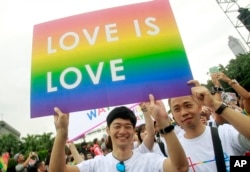A legal breakthrough this week for same-sex marriage in Taiwan will inspire LGBT activists to take up the cause elsewhere in Asia, but they will meet widespread resistance because of religion, tradition and authoritarian governments.
On Wednesday Taiwan’s Justices of the Constitutional Court said laws now fail to protect people’s legal “marriage freedom” and “rights to equality” for same-sex couples.
It asked parliament to adjust laws over the next two years to ensure that two men or two women can marry. If the laws are changed, Taiwan would be the first place in Asia to allow same-sex marriage, joining 20 countries outside the region.
Activists excited by ruling
The announcement excited LGBT activists who had pushed for marriage equality and garnered attention from supporters in other parts of Asia.
“Hong Kong LGBT friends, or even in mainland China, and in places such as South Korea and Japan and Thailand, we’ve had quite a bit of contact,” said Chien Chih-chieh, secretary general with the Taiwan Alliance to Promote Civil Partnership Rights.
“Their LGBT activists have worked extremely hard and hope their countries too can approve marriage equality,” she said. “So after Taiwan’s victory we immediately got a lot of congratulations from those activists. So I believe in the future our influence should be quite profound.”
Taiwan’s vibrant LGBT community, which has grown with two decades of social activism encouraged by politicians, wants marriage equality so couples can share assets, insurance benefits and the rights to raise children. Today only one person per unmarried couple has legal custody over any minors.
Jovi Wu, a sales worker in Taipei, would marry so her partner could share care for their 4-year-old girl, especially critical in the case of any medical emergency.
“We’ll definitely do it,” said Wu, 36. “That’s the guarantee our child needs the most, that two people have the rights to raise her.”
Rest of Asia more difficult
But elsewhere in Asia, one-party governments, in places such as China, are unlikely to follow Taiwan. They restrict activism such as the lesbian-gay-bisexual-transgender movements that would start marriage equality campaigns.
Japan lacks a multicultural element in its democracy, while South Korea’s Christian population would oppose same-sex marriage, said Jens Damm, associate professor in the Graduate Institute of Taiwan Studies at Chang Jung University in Taiwan.
Teachings of Islam would stop Indonesia, Malaysia and countries in the Middle East from considering same-sex marriage, experts believe. In the mostly Catholic Philippines, the president has said he’s opposed.
Vietnam abolished a ban on marriage equality but “stopped short of recognizing these marriages,” Washington-based advocacy group HRC Global said.
“Conservative religious doctrines and social mores” often impede same-sex marriage legislation in Asia, HRC Global deputy director Jean Freedberg said.
Cambodia and Thailand, however, have considered moving in Taiwan’s direction. The Thai parliament was considering a same-sex marriage bill in 2012 and dropped it only because of broader political instability at the time, according to media reports from Bangkok.
Obstacles in Taiwan
Marriage equality in Taiwan still faces obstacles, as well. Church groups and advocates of traditional Chinese family values have pressured legislators against changing the civil code in a way that would meet the demand of the constitutional court.
About 46 percent of the island’s public favors same-sex marriage and about 45 percent oppose it, the Taiwanese Public Opinion Foundation said in November.
“It’s not so simple, because the anti-LGBT groups of course are very unsatisfied with the explanation of the justices, so they’re still keeping up pressure,” said lawmaker Yu Mei-nu, who last year introduced a bill to change wording in the civil code. Her effort met with 30,000 protesters in December.
Same-sex marriages would cost the government extra benefit payouts if one person died and the other had no child for support, opponents say. Adult children often care for their parents in ethnic Chinese societies such as Taiwan’s.
Any children would lack understanding of the gender not represented by their parents, some believe, while same-sex couples might depend heavily on adoptions, a trend they call unfair to those children. About 5 percent of Taiwanese identify themselves as Christians.
“In the legislature, a lot of lawmakers are elected by district, so of course they will feel the pressure,” Yu said. “Therefore I think there’s still a ways to go before our bill as submitted to legislators can be voted on.”






